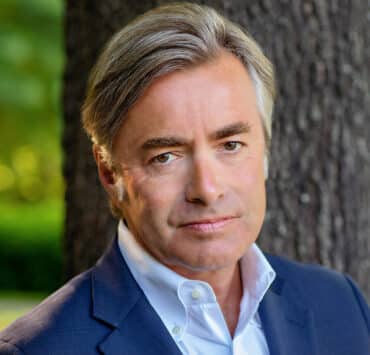Greg Moss, chief corporate strategy and legal officer at biotech company Evommune, came from a small suburb of Sydney, Australia, to seek his future in New York City. “We always looked to New York and Wall Street as big and bright,” he says. “It was an opportunity to be a part of that that led me to biotech and the decision to relocate to NYC with my wife.”
A corporate lawyer by training, he says he feels lucky to have been recruited to work in biotech and healthcare and to have had a few great mentors along the way. “At the end of the day, the work I’m doing today will hopefully have a profound impact for patients,” explains Moss, who is also the company’s corporate secretary and chief compliance officer.
Moss previously worked at biopharmaceutical company Kadmon Holdings Inc., which was acquired by French drugmaker Sanofi in 2021 for $1.9 billion, following the successful approval of REZUROCK, a drug approved by the FDA for the treatment of chronic graft versus host disease. There, he was responsible for legal, compliance, and business development operations. Before joining Kadmon in 2012, he worked for a large Australian law firm and at a boutique law firm and hedge fund in New York.
“People do best when they’re doing work they enjoy, and in high-functioning and high-performance teams, you really need to create a culture like that.”
Greg Moss
“There will be thousands of people who have life, and improved quality of life, because of the work we did at Kadmon. As I think about the diseases we’re going after today at Evommune, I find that incredibly motivating,” he says. “Drug development is a very challenging process, and there is a huge amount of financial opportunity if you’re successful, but for me, there is a nobility associated with this industry. I get to go to work and hopefully do something that will do good; I think about that a lot.”
Following Kadmon’s acquisition, Moss stayed to help with the integration. Then, in June 2022, he moved to Evommune, led by Luis Peña, the company’s president and CEO, where he also works alongside a few former Kadmon colleagues. “I had a very clear vision of the type of people I wanted to work with and the type of environment I wanted to be in,” he says. “I’m at a point in my life where I really wanted to work in a company I enjoyed, and people with whom I have a shared vision.
“Cofounders Peña, Eugene Bauer, Hans Hofland—who recently led R&D efforts at Dermira Inc., which sold to Eli Lilly & Company for $1.1 billion in 2020—and the Evommune team have an incredible track record in drug development and biotech building,” Moss notes, “which is amazing, but it is their unwavering commitment to developing a great company culture that drew me toward working with them.”
That means creating an environment where everyone feels confident speaking up and being part of the conversation. “That’s where innovation and team-building happens,” he explains in his April 2023 interview. “It’s only been ten months, but it’s gone really quickly because we’re having fun.”
“Evommune as a company wants to be a leader in the future of immunology.”
Greg Moss
As he learned during Kadmon’s transition from a R&D organization to a commercial company, the best way to execute in his compliance role was to make sure to hire the right people. “If you bring in the right people who have the ability to discern urgency together with making business decisions using integrity, then you can have an ethical and compliance-driven culture that’s not about what’s written in a policy or [standard operating procedure],” he says.
Eric Blanchard, partner at Cooley, worked closely with Moss during his time at Kadmon. “At Kadmon, Greg’s people-first approach enabled him to navigate the most complex and sensitive corporate matters with skill, and achieve outstanding outcomes for the company,” he says. “I am confident his approach will yield similar results at Evommune.”
In applying this at Evommune, which currently has twenty-three employees, Moss says that “if people have strong character and use integrity in their personal lives and with their colleagues, they’ll do it when nobody’s looking.”
He makes sure to use “please” and “thank you” and aims to give people in his reporting structures as much of the work that motivates them as possible. “People do best when they’re doing work they enjoy, and in high-functioning and high-performance teams, you really need to create a culture like that,” he says. He believes this has helped define the great biotech companies of the past. “They talk about the fun and the lifetime friendships they’ve made.”
He also believes creating a culture of psychological safety gives employees the space to ask questions—even ones that might be perceived as provocative or controversial. This provides more visibility into decisions that might need evaluation while there’s still time to intervene. That means ensuring workers are confident and comfortable enough to communicate without worry. “It will allow you to see things coming way before they come,” he says.
With headquarters in Palo Alto and five team members in New York, the Evommune team works respectfully across time zones, he says. About 60 percent to 70 percent of his time is spent on strategic business development, with the remaining 30 percent to 40 percent focused on more traditional legal and compliance work such as governance, policy infrastructure, reviewing documents, and helping business units engage with vendors, investors, and partners.
“If the goal is the same—delivering safe and effective drugs to patients in a compliant way—then you should be able to find alignment with colleagues, no matter what hat they’re wearing.”
Greg Moss
“I work cross-functionally, so I work with the management team and the team members in each of the different verticals, whether it’s clinical development, chemistry manufacturing controls, finance or R&D,” he says. “As the head of corporate strategy and business development, I need to understand where we are in each of those programs.” When they talk to potential collaborators, big pharma, or anyone else interested in the programs, he can give them the rationale for the potential match.
“Evommune wants to be a leader in the future of immunology,” he says. “In today’s market, we must create a culture and a community where collaboration, values and transparency are key tenents of our mission, inlcuding governement agencies, academic centers, physician reserachers, payors, patient groups as well our employees. My hope is that we advance and develop innovative drug programs that make their way through regulatory approval and get to as many patients as possible, and have a lot of fun along the way.”
He adds that learning how to think as a lawyer has benefited him along the way, and he encourages anyone interested in business to see the background as beneficial and helpful toward reaching shared goals. “Lawyers are often perceived as being gatekeepers,” he says. “I don’t think they have to be that way—they can be considered a partner.
“If the goal is the same—delivering safe and effective drugs to patients in a compliant way—then you should be able to find alignment with colleagues, no matter what hat they’re wearing.”
Clients partner with Cooley on transformative deals, complex IP and regulatory matters, and high-stakes litigation, where innovation meets the law. With 40-plus years of experience representing global healthcare and life sciences companies, including nearly 50 percent of the NASDAQ Biotechnology Index, Cooley is the go-to firm for some of the most innovative companies in the space. Cooley has nearly 1,400 lawyers across 18 offices in the United States, Asia, and Europe. Many of these professionals are backed by a wealth of supporting experience, having been pharmaceutical marketing specialists, business consultants, financial leaders, biotech researchers, and in-house counsel at life sciences companies.


